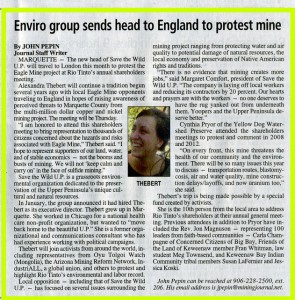The Daily Mining Gazette | November 6, 2013
By Garrett Neese – DMG writer (gneese@mininggazette.com)
HOUGHTON – Despite the economic benefits of mining, the instability and other drawbacks mean the western Upper Peninsula is better off looking elsewhere for prosperity.
That conclusion was reached by Thomas Power, who presented the results of a recent study on the economic impact of copper mining Tuesday night in the Upper Peninsula. Power, a research professor and former economics department chair at the University of Montana, prepared the report for Friends of the Land of Keweenaw, an environmental advocacy organization.
Power appeared at Michigan Technological University Tuesday as part of its Green Lecture Series.
Garrett Neese/Daily Mining Gazette
Thomas Power, a research professor and former economics department chair at the University of Montana, delivers his talk “The Economic Anomaly of Mining: Treasure and Tears” at Michigan Technological University Tuesday night.
In his report, he argues the western U.P. should concentrate on “economic gardening” – supporting start-up and existing businesses – and protecting and enhancing environmental amenities and other “quality of life” assets.
Power said he doesn’t have any animosity toward mining. He came from a metal mining family, and spent the first 18 years of his life falling asleep to the “soft thump” of the Bay View Rolling Mill in Milwaukee. But in many cases, the drawbacks of mining outweigh the positives.
Mining grew popular because of some very real economic benefits: the ability to extract valuable minerals, the high wages for workers – at times, averaging 40 percent higher the average working wage – and the tax revenues for municipalities.
However, any positive impact is tempered by instability, Power said – not just the familiar boom-bust trajectory, but the “flicker.” That occurs as prices in the international metal markets fluctuate, affecting the mine’s profitability. In turn, the mines compensate by reducing the labor force.
“It’s one thing to talk about high wages, but if the high wages are unreliable, the impact of those high wages on the local economy is going to be different than wages people think that they can count on,” Power said.
Technological advances have made mineral extraction more feasible in spots. But the increase in productivity has also reduced the number of employees neede. From 22 workers in 1970, the number needed to produce a thousand megatons dropped to six in 2004, rebounding slightly for unknown reasons to 10 now.
Because the mining job paid better than most of the alternatives laid-off miners are likely to find, they’re more likely to stay around the area and hope to be rehired, Power said.
“They hang on, hoping to be rehired,” he said. “Instead, what they see is more people being laid off.”
The economic benefits to mining are often least felt in the immediate area. Because of their high wages, miners can afford to live in more upscale areas. Often, they don’t want to live near the mine, where environmental degradation or the end of the mine can hurt property values. That potential for instability also discourages investment in local infrastructure, such as schools.
Power didn’t call for an end to mining, but said residents should apply the same kind of cost-benefit thinking mining companies use when they approach projects.
“We have to make choices, and we have to make choices because there are costs as well as benefits,” he said. “What citizens have to do, from a public interest point of view, is to weigh the clear economic benefits associated with mining, but also recognize the potential cost to the community, then make their decision and urge their representatives in government to do the same thing.”
William Keith of Houghton said he hadn’t known miners would commute so far for work.
“I thought it was an engaging presentation,” he said.
Permalink: http://www.mininggazette.com/page/content.detail/id/531850/Economist-presents-results-of-copper-mining-study.html?nav=5006
Full report available at http://www.folkminingeducation.info/wp-content/uploads/2013/07/Minings-Economic-Impact-on-Western-UP1.pdf

